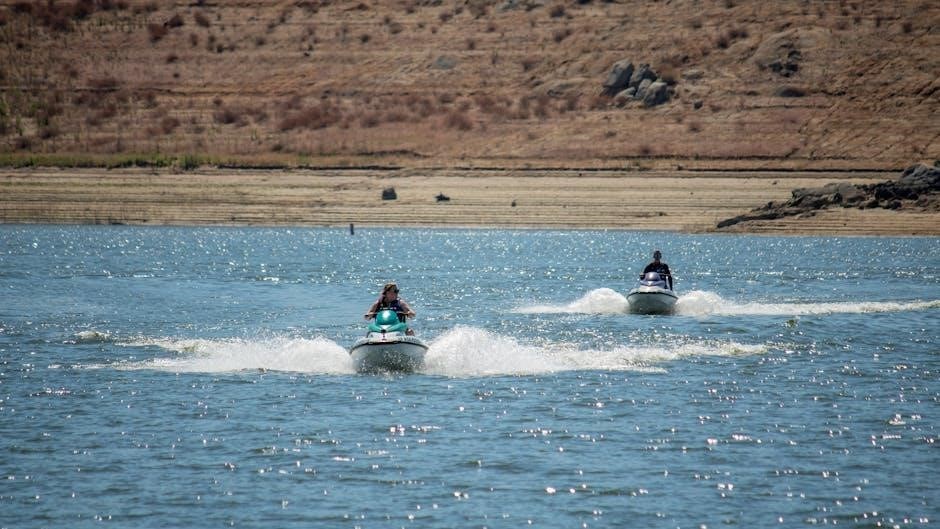Water fasting is a transformative practice involving only water consumption for 24–72 hours, used for purification, spiritual growth, and physical renewal, rooted in ancient traditions.
What is Water Fasting?
Water fasting is a practice where an individual consumes only water for a specified period, typically ranging from 24 to 72 hours. It involves abstaining from all food and beverages except water, promoting detoxification and physical renewal. Often used for weight loss, spiritual reflection, or health improvement, water fasting is a simple yet powerful method to reset the body and mind, fostering clarity and rejuvenation.
A Brief History of Fasting Practices
Fasting has been practiced for centuries across various cultures and religions, often for spiritual, detoxification, or health purposes. Ancient civilizations, including Greek physicians and religious leaders, embraced fasting as a purification ritual. Today, water fasting continues to evolve, blending traditional methods with modern health science to promote well-being and self-discovery. Its enduring popularity reflects its universal appeal and benefits.
Benefits of Water Fasting
Water fasting promotes weight loss, detoxification, and improved mental clarity. It also supports cellular renewal and longevity, enhancing overall health and well-being through targeted physiological processes.
Physical Benefits: Weight Loss and Detoxification
Water fasting accelerates weight loss by burning stored fat for energy. It also detoxifies the body by eliminating toxins through urine and sweat, enhancing metabolism and rejuvenating organs. This process supports overall physical health and vitality, making it a popular choice for those seeking a natural cleansing method. Regular fasting can reset the digestive system, improving nutrient absorption and reducing inflammation, contributing to a healthier lifestyle. Additionally, the reduced caloric intake allows the body to focus on self-repair, potentially extending longevity and improving immune function, as supported by various studies and expert recommendations.
Mental and Spiritual Benefits: Clarity and Focus
Water fasting enhances mental clarity by quieting the mind and improving focus. It fosters spiritual growth, allowing for introspection and a deeper connection with oneself. Many practitioners report heightened self-awareness and emotional balance. Prolonged fasting can also increase self-discipline and mental resilience; These benefits vary among individuals, but for many, water fasting becomes a transformative experience that transcends physical effects, nurturing inner peace and spiritual renewal.
Longevity and Cellular Renewal
Water fasting can promote longevity by triggering cellular renewal and autophagy, a natural process where the body recycles damaged cells. This clearance enhances metabolic efficiency, potentially slowing aging. Fasting also stimulates the production of new cells and strengthens the immune system. Over time, these changes may contribute to a longer, healthier life, making water fasting a popular choice for those seeking anti-aging and regenerative benefits.
Preparing for a Water Fast
Preparation is crucial for a safe and effective water fast. Consult a healthcare professional, set realistic goals, and gradually reduce food intake to ease into fasting.

Consulting a Healthcare Professional
Consulting a healthcare professional is essential before starting a water fast, especially for those with health conditions. They can assess risks, provide personalized advice, and monitor your condition to ensure safety and effectiveness. This step is crucial for preventing complications and addressing any concerns, ensuring a safe and successful fasting experience tailored to your health needs.
Setting Realistic Goals and Duration
Setting realistic goals and duration is crucial for a successful water fast. Beginners should start with shorter periods, such as 24–48 hours, and gradually increase as their body adapts. Listen to your body and set achievable targets based on your health and fasting experience. A typical water fast lasts 24–72 hours, but longer durations require medical supervision. Start small and build confidence before extending your fast.
Gradual Transition to Fasting
A gradual transition to fasting is essential to avoid shocking your system. Start with shorter fasts, such as 12–24 hours, and slowly increase the duration as your body adapts. Incorporate intermittent fasting to ease into the practice. This approach allows your metabolism and mindset to adjust, ensuring a smoother and more sustainable fasting experience. Listen to your body and progress at a pace that feels comfortable and safe.

The Water Fasting Process
Water fasting involves drinking only water for 24–72 hours, allowing your body to cleanse and rejuvenate. Beginners should start with shorter periods and gradually extend.

What to Expect During the Fast
During a water fast, you may experience initial hunger, followed by increased energy and mental clarity. Detox symptoms like headaches or fatigue can occur but typically subside. The body transitions to ketosis, burning fat for fuel, and autophagy begins, promoting cellular renewal. Emotional shifts and heightened focus are common as the body and mind detoxify together naturally.
Tracking Progress and Listening to Your Body
Monitoring your hydration levels, hunger cues, and energy levels is crucial during a water fast. Track improvements in mental clarity and physical sensations. Listen to your body’s signals; dizziness or extreme fatigue may indicate it’s time to stop. Gradually extend fasting periods to build tolerance. Use journaling or apps to document progress and stay motivated, ensuring a safe and mindful fasting experience.
Staying Hydrated and Managing Hunger
Drink plenty of water throughout the day to stay hydrated, aiming for at least 8-10 glasses. Coconut water can help replenish electrolytes but isn’t more hydrating than plain water. Manage hunger by sipping water slowly and staying active. Mild hunger is normal, but severe hunger or dizziness may signal overhydration or nutrient depletion. Rest when needed and avoid overexertion to maintain balance during your fast.
Safety and Precautions
Consult a healthcare professional before fasting, especially if you have medical conditions. Risks include dehydration, nutrient deficiencies, and electrolyte imbalances. Always fast under medical supervision for extended periods.

Understanding Risks and Contraindications
Water fasting may pose risks for certain individuals, such as those with diabetes, low blood pressure, or a history of eating disorders. Prolonged fasting can lead to dehydration, electrolyte imbalances, and nutrient deficiencies. It is crucial to consult a healthcare professional before starting, especially for extended fasts, to ensure safety and address any potential contraindications.
Medical Supervision for Extended Fasts
Extended water fasts require medical supervision to ensure safety, especially for individuals with health conditions. A healthcare provider can monitor vital signs, prevent complications, and adjust fasting plans based on individual needs. Regular check-ups and blood work help assess hydration levels, electrolyte balance, and overall well-being. Professional guidance minimizes risks and ensures a safe fasting experience, particularly for fasts lasting beyond 72 hours.
Knowing When to Stop the Fast

It’s crucial to recognize when your body signals the need to stop fasting. Signs include extreme fatigue, dizziness, nausea, or severe hunger. If you experience fainting, chest pain, or mental fog, it’s time to break the fast. Always listen to your body and consult a healthcare professional if concerns arise. Your health and safety should never be compromised for the duration of the fast.
Breaking the Fast
Breaking a water fast requires careful reintroduction of food to avoid digestive shock. Start with small portions of nutrient-rich foods like broth or juice, then gradually incorporate solid meals.
Post-Fasting Nutrition and Recovery
After breaking your fast, prioritize gradual reintroduction of nutrient-dense foods to avoid shocking your digestive system. Begin with small portions of broths, juices, or steamed vegetables, ensuring gentle digestion. Incorporate lean proteins and whole grains as your body readjusts. Hydration remains crucial, and rest is essential for full recovery. Avoid heavy or processed foods initially to maximize the benefits of your fasting journey and support overall well-being.
Common Mistakes to Avoid
Avoid extended fasting without medical supervision, as it can lead to severe health complications. Overeating post-fast is another mistake, risking digestive issues. Many individuals underestimate the importance of gradual transition, leading to discomfort. Ignoring hydration guidelines can exacerbate hunger and fatigue. Additionally, skipping professional advice, especially for those with health conditions, is a critical error. Listening to your body and setting realistic goals is essential for a safe and effective fasting experience.

Common Myths and Misconceptions
Many believe water fasting cures diseases like cancer, but evidence is anecdotal. Others think coconut water is more hydrating than plain water, which is false.
Debunking Claims About Water Fasting
While water fasting is praised for its benefits, claims that it cures serious diseases like cancer are anecdotal and lack scientific backing. Some believe it enhances brain function or longevity, but evidence is limited. Coconut water is often touted as more hydrating than plain water, yet studies show it’s not. Fasting can aid weight loss and detoxification but isn’t a magic solution. Risks exist, especially for certain individuals, making medical guidance crucial.
Separating Fact from Fiction
Water fasting, while popular, is surrounded by myths. It aids weight loss and detoxification but isn’t a cure-all for diseases like cancer. Claims of enhanced longevity or brain function lack robust evidence. Benefits are real, but risks like nutrient deficiencies and health complications exist. Medical supervision is vital, especially for extended fasts. Balancing proven benefits with caution is key to a safe, effective fasting experience.

Testimonials and Success Stories
Individuals worldwide share inspiring experiences, citing improved health, mental clarity, and spiritual renewal. Experts like Dr. Uys and Gary Brecka endorse water fasting for its transformative benefits.
Personal Experiences with Water Fasting
Many individuals report profound benefits from water fasting, including enhanced mental clarity, emotional balance, and physical rejuvenation. Some share stories of overcoming chronic health issues, while others highlight spiritual growth. Experts like Dr. Uys and Gary Brecka often cite personal transformations, emphasizing the practice’s potential for renewal and self-discovery. These testimonials underscore the diverse and deeply personal benefits of water fasting, inspiring others to explore its possibilities.
Expert Opinions and Recommendations
Experts endorse water fasting for its potential to reset metabolism and enhance detoxification. Dr. Jason Fung highlights its benefits for weight loss and insulin control. Many recommend starting with shorter fasts and gradually increasing duration. Staying hydrated and listening to your body are crucial. Supplements like PerfectAmino can support muscle retention. Always consult a healthcare professional before beginning, especially for extended fasts, to ensure safety and effectiveness.

Resources and Tools
Explore comprehensive guides, structured protocols, and online communities for support. Utilize tracking apps and supplements to enhance your fasting experience effectively.
Recommended Reading and Guides
Discover essential books like The Ultimate Guide to Water Fasting, offering detailed tips and best practices. Explore structured protocols and expert advice from biologists like Gary Brecka, who shares insights on fasting safely. Online resources provide step-by-step guides, while communities and forums offer shared experiences. Supplements like PerfectAmino are recommended to support fasting journeys, ensuring optimal nutrition and minimizing muscle loss during extended fasts.
Online Communities and Support Groups
Join vibrant online forums and groups dedicated to water fasting, where individuals share their journeys and tips. Platforms like social media groups and specialized fasting forums offer support and resources. Experts such as Dr. Uys and Gary Brecka host live sessions, providing guidance and answering questions. These communities foster connection and motivation, helping participants stay committed to their fasting goals and overcome challenges together.

Supplements and Products for Fasting
Consider using supplements like PerfectAmino to prevent muscle loss during extended fasts. Electrolytes and probiotics can support hydration and gut health. Products designed for fasting help maintain essential nutrients without breaking the fast. These tools enhance the fasting experience, ensuring the body stays nourished and balanced throughout the process.
Water fasting offers profound transformation, from physical renewal to mental clarity. Approach it responsibly, consult experts, and embrace its potential for a healthier, more balanced life.
Final Thoughts on Water Fasting
Water fasting is a powerful tool for physical and mental rejuvenation, fostering clarity and self-discovery. With proper preparation and medical guidance, it can lead to lasting health benefits and personal growth. Embrace this ancient practice responsibly, respecting your body’s limits, and unlock its transformative potential for a balanced and fulfilling life.
Next Steps for Those Interested
For those intrigued by water fasting, start by consulting a healthcare professional to ensure safety. Begin with short fasts, gradually increasing duration. Explore resources like The Ultimate Guide to Water Fasting for tips and support. Join online communities for shared experiences and guidance. Most importantly, listen to your body and prioritize your health throughout your fasting journey.

Leave a Reply
You must be logged in to post a comment.